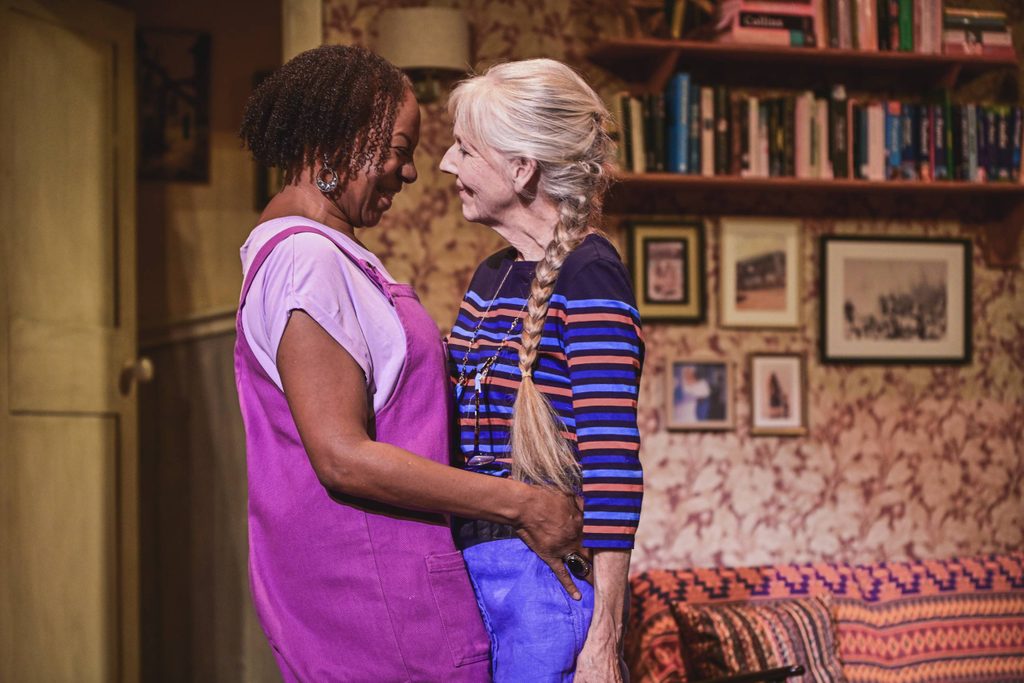
The Guardian
4 stars out of 5
Es & Flo review – devoted couple contend with the brutality of dementia
Kiln theatre, London
Tender portrait of a woman caring for her love – joy and affection seep through performances that ache with the tragedy of seeing your partner slip away
Es and Flo dance in the kitchen, their knees tucked tightly together, their hands clasped around each other’s backs. They snog passionately and the audience cheer. To see this soft, sexy moment between these two older women feels remarkably rare and somehow affirming; look, this play says, this is the joy you can have. This is what commitment can look like.
Jennifer Lunn’s play knocks at the door of Liz Crowther’s spritely Es and Doreene Blackstock’s protective Flo. The pair have stood side by side for 40 years, from the community chaos of Greenham Common to the happy haven of the home they’ve shared and shaped together (delicately designed by Libby Watson). But as Es starts showing symptoms of dementia, everything they’ve built together begins to unravel. Having hidden their relationship from her family and never officially married, everything is in Es’s name; Flo could be swept aside with no control over her partner’s future care.
Deceptively sweet, this domestic drama hits all the hideous beats of a typical tale of dementia. As Flo struggles to accept help, it is strikingly clear that there is no right answer or easy option – and this is without money even being an issue. Under Susie McKenna’s direction, the performances ache with how hard it can be to see your loved one slip away, and how difficult it can be to want, more than anything, not to be a burden. And yet the characters are so charming and funny, and their dedication to each other so complete, that joy and affection seep through at every turn.
Rose-tinting comes into play with the unfailing generosity of care worker Beata (Adrianna Pavlovska), paid for by Es’s absent son and his cold but thawing wife Catherine (Michelle McTernan); few shift-working care workers have the time to stay late for pizza or sit by a hospital bed overnight. But Beata’s warmth oozes over the story, as she and her considerate daughter Kasia (played tonight by Chioma Nduka, the role split with Renée Hart) become part of Es and Flo’s found family.
The ending may be overly neat, but who cares when it means the brutal loneliness of dementia can be lightened just a little? With heart and soul, Es & Flo is a tender portrait of a woman caring for her love, in sickness and in health.
Whats on Stage
4 stars out of 5
Es & Flo at the Kiln Theatre – review
Jennifer Lunn’s play transfers to London from Cardiff
Jennifer Lunn is already an established director and producer, but in this tender drama, first seen in April at Wales Millennium Centre, she proves herself an accomplished playwright as well.
Es and Flo are a lesbian couple who met at the landmark Greenham Common demonstrations in the 1980s (images and chants from the protest are a motif between scenes). Now in their 60s and 70s, they are coming to terms with the fact Es has dementia, and the increasing demands this places on her care.
It’s a situation familiar to so many, but the fact these women love each other adds complication, particularly as Es’s son Peter, who rarely visits, apparently doesn’t know about the relationship. He has hired a part-time carer, Beata, and sent his wife Catherine to persuade his mother to sign over her power of attorney.
In the middle of all this, Flo is desperately trying to cling on to the woman she loves, rebuffing offers of help. And Es clings back, often literally; Susie McKenna’s production contains many moments of intimacy, including a passionate slow dance, that leave us in no doubt as to the strength of their bond.
It contains some fine performances too, not least Liz Crowther and Doreene Blackstock as the central couple. Crowther shows Es’s increasing confusion with great pathos, capturing the frustration of a bright mind fully aware of its own dimming, while Blackstock’s Flo simmers with rage at her status as Es’s “good friend”.
The all female ensemble also features Adrianna Pavlovska as Beata, whose own story of familial rejection due to having a mixed heritage daughter (played superbly by the scene-stealing Chioma Nduka) chimes with Es and Flo’s. And Michelle McTernan does a good job of showing the way Catherine’s outward pomposity masks deeper suffering.
Although at times the dialogue can feel a little expositional, words filling spaces where none are needed, it packs emotional punch when it matters, particularly in the second half when Libby Watson’s domestic set undergoes a coup de theatre to move us to the hospital where Es has been taken after a fall.
It’s a deeply moving love story, shown not at its inception but at its end. And, through this, it’s also a rallying cry for the essential right of women to marry one another. The love of Es and Flo, so misunderstood by their own families, represents not just a sanctuary for them, but for all who come into their orbit, including us.